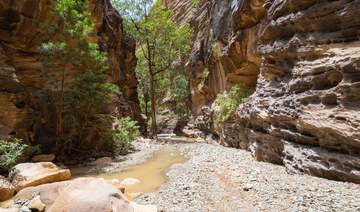NEW DELHI: Expectations were high when five big, developing nations in 2009 joined as the so-called BRICS. The cooperation of the fast-rising economies driving world growth seemed to herald a new era of putting poverty alleviation and infrastructure development first.
The five BRICS countries — Brazil, Russia, India, China and South Africa — do not lack for heft.
They represent nearly half the world’s population and a quarter of its economy, at a combined $16.6 trillion.
But at a summit in the western Indian state of Goa Saturday, their leaders will be struggling to temper their tendency to compete, rather than collaborate, in boosting their slowing economies.
The five nations face unique challenges that make coordination tricky.
The authoritarian systems in Russia and China diverge from the lively democracies in India, South Africa and Brazil.
Conflicting alliances with non-BRICS countries mean the group is unlikely to reach a consensus over issues such as the war in Syria or tensions in the South China Sea.
Within their ranks, the four other nations are chafing at China’s increasing dominance in manufacturing and trade and seem unlikely to support a push by Beijing for more open markets when they are striving to keep their own heads above water.
“BRICS is still a work in progress,” says H. H. S. Vishwanathan, a former Indian diplomat in the US and several African countries.
“If one looks at statements from the last seven summits, the agenda of the group is constantly evolving and expanding.”
Chinese academics and analysts have floated the idea of pushing for a free-trade agreement among the BRICS. A Chinese Commerce Ministry spokesman said last month that, while China hasn’t made such a proposal formally, it believes that removing tariffs and other barriers could be important for practical cooperation between the five nations.
Such an idea would likely fall flat with other BRICS countries anxious over cheap Chinese goods flooding their markets and already burdened by huge trade deficits with Beijing.
“It is likely the Chinese may not bring it up at all, because they would not want to be in an embarrassing position,” Vishwanathan said. “This is a nonstarter for the BRICS.”
In Goa, the BRICS leaders are likely to buttress their development-focused economic agenda with a decision to establish their own credit-rating agency, which they argue would treat developing countries more fairly than existing ones favoring Western economies.
They are also mulling founding a think tank to help shape international dialogues on finance.
More modest aims include easing visa restrictions for business leaders and increasing investments from China, especially for funding infrastructure projects.
“While we cannot expect any big announcement over a BRICS free trade arrangement, the Goa summit statement will reflect the desire of the five to strengthen trading arrangements to push intra-BRICS trade,” said Samir Saran, vice president of the Observer Research Foundation think tank in New Delhi and a member of the BRICS Think Tank Council.
To date, the BRICS group’s biggest achievement has been launching a financing alternative to the International Monetary Fund and World Bank intended to expand lending for infrastructure projects, initially within their countries.
The Shanghai-based New Development Bank approved its first set of loans totaling $911 million this year for renewable energy projects in the five founding member nations.
“The fact that the NDB was created in three years and has already cleared more than $900 million worth of projects this year is quite creditable,” said Vishwanathan, the former Indian diplomat.
Overshadowing the meeting in Goa is the hard reality of slowing growth around the globe.
China’s expansion has slowed to its slowest pace in 25 years, though it is still near a robust annual pace of 7 percent.
Russia has been flummoxed by declining oil prices. Brazil is just emerging from its worst recession since the 1930s. South Africa’s economic turmoil could lead to its credit rating being downgraded to junk by the year’s end.
India, with an economy growing at a 7.5 percent pace, is still failing to create the 1 million new jobs it needs each month as enormous numbers of youths join the work force.
Still, they still have the potential to alter the order of world trade, said Biswajeet Dhar, an economics professor at New Delhi’s Jawaharlal Nehru University.
Other trading arrangements, such as the WTO, are heavily influenced by the industrialized countries, he notes. And a US-led push for a Pacific Rim trade block, the Trans-Pacific Partnership, has yet to take off.
“This is the opportunity for the BRICS countries to craft a more equitable global trading order,” Dhar said.
Slower growth and rivalries key issues at BRICS summit in Goa
Slower growth and rivalries key issues at BRICS summit in Goa

Saudi Arabia’s Sports Boulevard doubles its existing investment fund to $533m
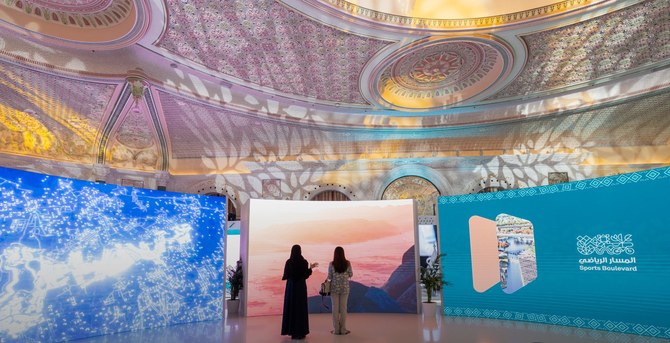
RIYADH: Private sector participation in the Sports Boulevard project is set to increase as the foundation behind Riyadh’s largest linear park plans to double its investment fund to SR2 billion ($533 million).
In a press release, the Sports Boulevard Foundation announced its partnership with Ajdan Real Estate Development Co. and Albilad Capital to add an additional SR1 billion to the private real estate investment fund “Sports Boulevard Real Estate Fund 1.”
This increased funding will be utilized to bolster private sector participation within the Arts District, one of the destinations within the Sports Boulevard project.
The Sports Boulevard Development Co. will continue to hold the majority of units in the fund, while Ajdan Real Estate Development Co. will serve as a developer and primary investor, and Albilad Capital will act as the fund manager.
This partnership underscores the collaborative effort behind the expansion, signifying a strategic alliance aimed at creating a vibrant urban space that enhances Riyadh’s cultural and economic landscape.
The project aims to develop a mixed-use lifestyle destination consisting of residential, retail, office, and entertainment components.
Covering a land area of over 39,000 sq. m. at the heart of the Arts District, the total combined built-up site spans approximately 240,000 sq. m., boasting over 100,000 sq. m. of net leasable area.
The design of this destination draws inspiration from the Sports Boulevard Design Code, influenced by the Salmani Architectural Style. This ensures a dynamic and immersive lifestyle experience for both residents and visitors.
Situated at the intersection of Prince Mohammed bin Salman bin Abdulaziz Road and Prince Turki bin Abdulaziz Al Awwal Road, it offers expansive public spaces, recreational areas, and cycling-friendly tracks.
Covering an area of 184,000 sq. m., the project extends beyond private development parcels, providing ample space for recreational activities and pedestrian-friendly pathways, efficiently linked to the promenade and cycling bridge.
Sports Boulevard, a mega project launched by King Salman bin Abdulaziz in 2019, and supported by Crown Prince Mohammed bin Salman bin Abdulaziz, spans over 135 km on Prince Mohammed bin Salman bin Abdulaziz Road.
It features safe green pathways for pedestrians, cyclists, athletes, and horse riders, connecting Wadi Hanifah in the west to Wadi Al Sulai in the east.
Additionally, the project includes over 4.4 million sq. m. of greenery, open spaces, and up to 50 multidisciplinary sports facilities. It also hosts several unique destinations and investment zones, totaling an area exceeding 3 million sq. m.
Closing Bell: Saudi benchmark index edges down to close at 11,831
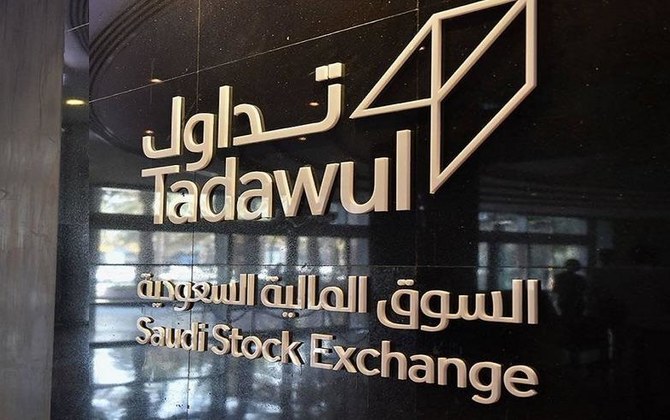
RIYADH: Saudi Arabia’s Tadawul All Share Index slipped on Monday, losing 19.42 points, or 0.16 percent, to close at 11,831.22.
The total trading turnover of the benchmark index was SR5.8 billion ($1.5 billion) as 110 stocks advanced, while 108 retreated.
On the other hand, the Kingdom’s parallel market Nomu also slipped 189.65 points, or 0.71 percent, to close at 26,448.54. This comes as 30 stocks advanced while as many as 34 retreated.
Similarly, the MSCI Tadawul Index also dropped 2.67 points, or 0.18 percent, to close at 1,470.41.
The best-performing stock of the day was Saudi Paper Manufacturing Co. The company’s share price surged 4.89 percent to SR75.10.
Other top performers included CHUBB Arabia Cooperative Insurance Co. as well as Middle East Specialized Cables Co., whose share prices soared by 3.96 percent and 3.46 percent, to stand at SR34.10 and SR32.85 respectively.
On Nomu, Osool and Bakheet Investment Co. was the top gainer, with its share price rising by 9.22 percent to SR48.
Other best performers on Nomu were View United Real Estate Development Co. as well as Al-Modawat Specialized Medical Co., whose share prices soared by 6.53 percent and 6.20 percent to stand at SR79.90 and SR150.80, respectively.
Additional top gainers included Almujtama Alraida Medical Co. and Bena Steel Industries Co.
On the announcement front, Saudi Basic Industries Corp., known as SABIC, received all necessary approvals from relevant authorities to complete the acquisition of its subsidiary Saudi Iron and Steel Co., also known as HADEED, by the Public Investment Fund.
In a statement on Tadawul, SABIC announced that it has satisfied all transaction-related conditions to complete the SR12.5 billion acquisition announced earlier in September 2023.
Furthermore, Saudi Arabia aluminum producer Al Taiseer Group Talco Industrial Co. is listing a 30 percent stake on the Tadawul stock exchange following an initial public offering, setting the final offer price at SR43 per share.
The company is selling 12 million shares and has completed the book-building process for institutional investors, which saw a coverage of 68.5 times the total offer shares, according to Alinma Investment Co., the lead manager and financial adviser to the issuance.
The book-building process for retail investors will run for two days starting on May 28. During this time, they can subscribe to a maximum of 10 percent of the shares. The final share allocation is set for June 2.
Saudi Arabia focused on promoting energy efficiency: top official
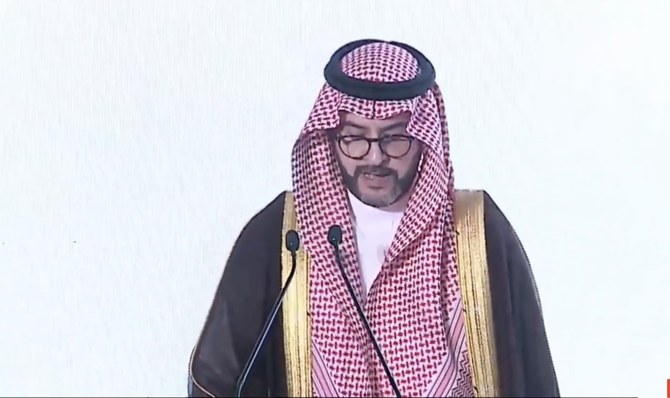
RIYADH: Saudi Arabia’s budding energy efficiency sector has witnessed notable growth, with the number of licensed service providers reaching 55 by the end of 2023, says a top official.
As the Kingdom strives to reduce its carbon footprint, with recently amplified goals to achieve net-zero by 2060, the Saudi Energy Efficiency Center is working to aide the nation in realizing these ambitions, Nasser Al-Ghamdi, the CEO of the center noted.
In his inaugural address at the Saudi ESCO forum, the top executive stressed the entity’s role in raising awareness about energy efficiency. He highlighted that 26 universities nationwide have adopted energy efficiency topics and courses in their curricula.
“Since the inception of the center, we have launched various initiatives that will help in reducing energy consumption,” Al- Ghamdi said.
Among these undertakings, the body has succeeded in launching and implementing more than 200 training programs in the field of energy efficiency, the CEO added.
The executive emphasized that the center has strived to create the necessary ecosystem for suppliers and their beneficiaries in this “promising market” to ensure the quality of energy-efficiency service providers.
He added that this will be achieved through the application of a licensing system for those interested in investing in this field after meeting the technical requirements necessary to provide the service.
Highlighting the role that the fledgling sector is playing in achieving net-zero goals, the CEO said: “The sector, which is considered relatively new, is helping companies and enterprises and buildings in finding solutions to efficiently use energy, including financing and managing solutions and projects. These companies also contribute energy consumption analysis and knowing opportunities for companies to improve their consumption.”
Due to the absence of energy efficiency activities in the commercial sector, one of the highest energy consumers in the Kingdom, accounting for 15.7 percent of total consumption of facilities in the nation, the body launched a pilot project to improve this field.
The initiative aims to improve conditions in the commercial sector by raising business owners’ awareness of opportunities, as implementing energy auditing projects is expected to improve overall efficiency.
Yanbu Royal Commission teams up with Skytower Investments for industrial projects development
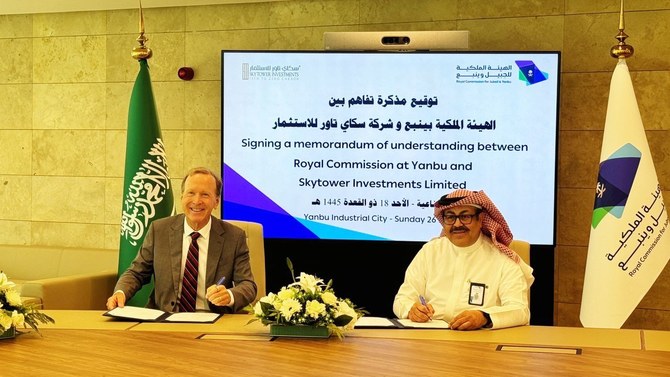
RIYADH: Saudi Arabia’s Yanbu governorate is poised to see the development of several industrial projects following an agreement between its Royal Commission and Skytower Investments Ltd.
The memorandum of understanding, signed by the commission’s CEO, Abdul Hadi Al-Juhani, aims to develop industries in the petrochemicals sector, specialized chemicals, renewable energy, and other manufacturing divisions.
This MoU signing is part of the Royal Commission’s ongoing efforts to attract more local and international investments to Yanbu Industrial City in promising sectors, aligning with the objectives of Saudi Vision 2030 programs.
Headquartered in Riyadh, STI is an investment firm specializing in renewable technology, green manufacturing, supply chain, and green power production.
“This is a result of significant development over the past nine months by both teams paving the way for more international manufacturing and localization projects landing in Yanbu,” Skytower said in a tweet on X.
It added: “This agreement will pave the way for more international manufacturing and localization projects landing in Yanbu, an industrial heartland with complete industry infrastructure and extensive manufacturing experiences.”
In April, STI signed a four-party joint agreement with Chinese automaker Chery Automobile Co., the Ministry of Investment, and the National Industrial Development Center.
This collaboration, driven by Saudi Arabia’s Vision 2030, signifies a crucial step toward future economic opportunities and the well-being of the Saudi people.
In August 2023, the Kingdom’s untapped southern region took a significant step toward welcoming international travelers.
Cruise Saudi and the Royal Commission for Jubail and Yanbu signed an MoU to unlock the region’s tourism potential. This strategic partnership was aimed at positioning the southern region as a captivating tourist destination, fostering growth in the travel sector and contributing to the region’s economic advancement.
Formalized during the MASAREB ceremony held in Jazan, the agreement encompassed a spectrum of efforts, from knowledge transfer to mutual alignment on ventures aimed at establishing the destination and yielding a positive local impact.
STI is a global partnership between NGOs, green businesses with advanced eco-friendly technology, sustainable manufacturing, and Saudi’s national sustainable economic development authorities.
Their aim is to develop practical plans for industry decarbonization, economic revitalization, technological advancement, and carbon-neutral technology.
Digital trade activities in UAE to grow by 12.3% annually
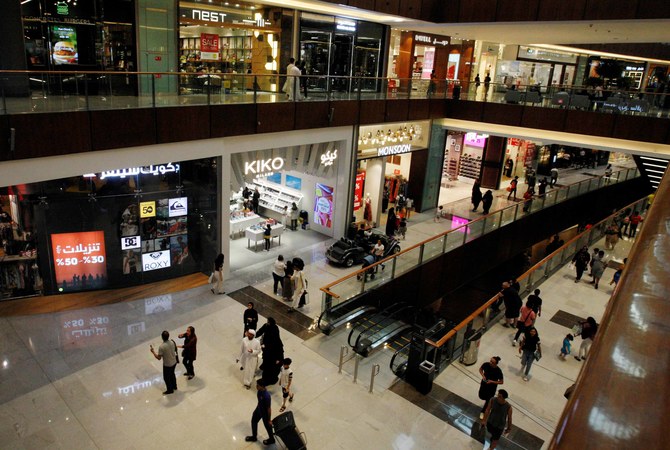
- Projected surge likely to be fueled by BNPL, fintech systems: report
RIYADH: Digital trade in the UAE is projected to grow at a compound annual rate of 12.3 percent from 2023 to 2028, fueled by the rise of “buy now, pay later” models and fintech systems.
A joint research paper, issued by the country’s Ministry of Economy and Abu Dhabi Chamber of Commerce and Industry, showed that more than 40 percent of consumers in the UAE rely on “buy now, pay later” models and fintech digital technology systems.
ADCCI CEO Ahmed Khalifa Al-Qubaisi said the research paper serves to strengthen his chamber’s position as a leading partner in the process of digital transformation in the business world.
“It aligns with the chamber’s strategy for digital transformation, aimed at attracting talent and expertise, exploring technological solutions, and integrating advanced AI technologies and tools such as Microsoft Copilot, into the current operational system at the Abu Dhabi Chamber,” he said.
Al-Qubaisi added this integration is intended to boost the level of productivity, improve the completion of daily tasks, increase customer satisfaction, and support the efforts of local and global businessmen and entrepreneurs.
He further said that the ADCCI continues its endeavors to enhance the quality of initiatives and projects dedicated to the private sector.
“The chamber employs various smart systems to analyze and process accurate data, as well as develop operational processes,” the CEO said.
He added that this approach aims to bolster sound decision-making and the formulation of effective strategic plans aligned with the aspirations of the business community in Abu Dhabi.
He noted that the paper provides a detailed overview of local, regional, and global regulatory frameworks and policies, key agreements, and the role of major international bodies such as the World Trade Organization in shaping the movement of traditional and digital trade and highlights new e-commerce practices that shape current trade dynamics.
The research paper revealed that about 49 percent of consumers in the UAE shop online frequently, with about 47 percent of the population relying on credit cards, which is much higher than the global average of 18 percent.
The research paper stated that it is expected that 20.1 percent of total global retail purchases will be completed online in 2024, while digital retail activity is expected to constitute around 25 percent of total global sales by 2027.



